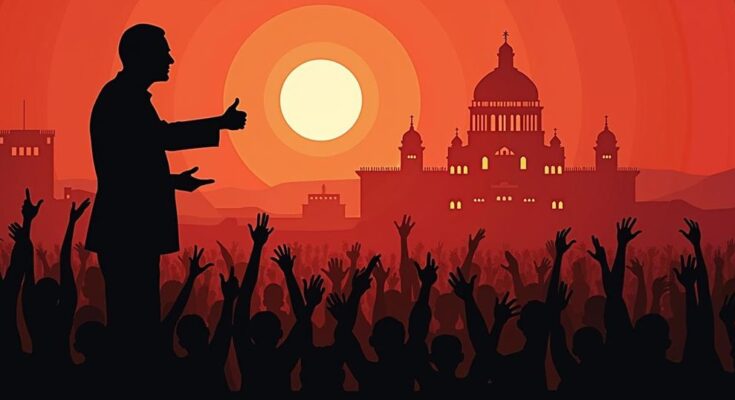Incumbent President Kais Saied is projected to win re-election amid allegations of election irregularities, with a low turnout of under 28%. Key opponents were either imprisoned or barred from running, leading to a political environment criticized for its lack of credibility. Tunisia’s democratic journey, initiated during the 2011 revolution, now faces significant challenges as the country grapples with economic crises and political repression under Saied’s rule.
In the wake of Tunisia’s presidential election results, incumbent President Kais Saied appears poised to secure a second term amid widespread allegations of election irregularities and an exclusionary political environment. Polls closed on Sunday evening, revealing that Saied, age 66, is projected to receive approximately 89.2% of the vote, albeit from a disturbingly low voter turnout of under 28%. This turnout marks the lowest in Tunisia’s post-revolution electoral history since 2011, raising further concerns about the legitimacy of the election process. Saied’s primary challengers included former lawmaker Zouhair Maghzaoui, 59, who initially supported Saied’s consolidation of power in 2021 but later opted to run against him. According to the exit poll, Maghzaoui is forecasted to obtain a mere 3.9% of the vote. The other contender, Ayachi Zammel, a lesser-known businessman currently incarcerated on charges related to his candidacy, is projected to garner around 6.9% of the vote. This election has been marred by the sidelining of significant political opponents, many of whom are either imprisoned or barred from participating, with Saied’s own electoral commission accused of bias. Tunisia, which was celebrated as the beacon of the Arab Spring’s democratic aspirations, now finds itself grappling with a regression towards authoritarianism. After taking power in a landslide victory in 2019, President Saied dismantled parliamentary structures and reformed the constitution, leading to increasing centralization of power and crackdown on dissent. Human Rights Watch has reported that over 170 individuals have been detained for alleged political motives or for exercising fundamental civil rights during Saied’s administration. Moreover, Tunisia’s political troubles are compounded by dire economic challenges, including rising unemployment, inflation, and shortages of essential goods—all contributing to a climate of discontent. Saied has shown reluctance to implement fiscal adjustments necessary for securing further financial assistance from international bodies, such as the International Monetary Fund, leading to continued socioeconomic strife. As Tunisia maintains its economic stability through tourism recovery and European Union financial assistance, the implications of this election on the country’s future remain tenuous at best.
The political landscape in Tunisia has dramatically shifted since the 2011 revolution, which ousted long-time dictator Zine El Abidine Ben Ali—sparking hopes for a democratic transition. Kais Saied’s rise in 2019 seemed to symbolize a continued evolution towards democracy; however, his subsequent actions have fostered a return to autocratic governance. Following his takeover of key governmental institutions and repression of prominent opposition figures, the current political climate is characterized by manipulative electoral practices and significant public disillusionment regarding democratic processes. The alarming decline in voter turnout reflects a populace increasingly disengaged from a political system viewed as undemocratic and coercive. This reversion to authoritarian rule poses a profound threat to Tunisia’s democratic aspirations and the rights of its citizens.
In summary, the electoral success of President Kais Saied appears to be underpinned by a flawed and compromised political framework that has systematically silenced opposition voices and undermined the integrity of democratic processes. With allegations of electoral malpractice and the imprisonment of key political opponents, Tunisia stands at a critical juncture. The persistence of Saied’s governance amid rising economic hardships raises pressing questions about the future of democracy in Tunisia and its ability to recover from the ongoing political and social crises.
Original Source: www.dw.com




